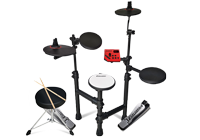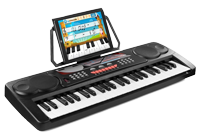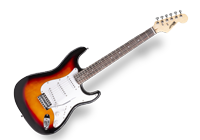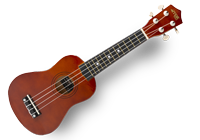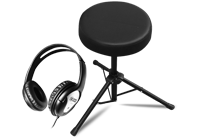Learning a musical instrument from a young age is an amazing way to get advantages in an arts world career. As social opportunities develop over time it tends to be the more skilled instrument players that are selected for the larger event circuit. Although, simply knowing the right person can be just as lucky in effect, this is where practising musical instruments for beginners at a young age comes into play.
With all the experience you've gained, grouped with the right personality and relatable personal brand you can begin getting connected and start carving your own path in many different industries. Spark up some creativity and get yourself or your youngsters practising their musical instruments routinely as part of a weekly schedule for fast results. Our great value musical instruments come with multiple options for reduced volume rehearsal, built-in tutorial functions and practice songs to play alongside.
Musical instruments hold a vital place in music, serving as tools of expression and creativity across various genres and settings. From live performances to recording studios, they remain indispensable for hobbyists, students, and professionals alike. As the music industry evolves, the role of traditional instruments continues to thrive, bridging both modern and classical styles.
For learners beginning their journey with beginner music instruments, options like keyboards, acoustic guitars, and drum kits offer accessible entry points. These instruments allow individuals to develop foundational skills that can later support advanced techniques and broader musical exploration.
Schools and community centres frequently use music instruments to foster engagement with the arts. Whether in classrooms or informal jam sessions, they encourage collaboration and the development of rhythm, melody, and harmony. This adaptability ensures their relevance in both professional and personal contexts.
Why Learning Beginner Music Instruments Is a Lifelong Skill
Learning to play musical instruments offers benefits that extend far beyond the ability to create music. It can improve focus, memory, and coordination, making it an invaluable skill for individuals of all ages. Regular practice builds patience and discipline, which often translate into other aspects of life.
For children, learning beginner music instruments like keyboards or acoustic guitars provides an ideal introduction to music. These instruments are easy to handle and designed to simplify the learning process, ensuring a rewarding experience. Early exposure to music fosters cognitive growth, helping young learners develop skills that can influence their academic and creative pursuits.
Adults can also benefit significantly from picking up music instruments, whether reigniting a childhood passion or beginning a new hobby. Learning music can alleviate stress, provide an outlet for creativity, and build confidence over time. Additionally, it offers opportunities for group interaction, such as joining bands or participating in community performances.
Exploring the Range of Music Instruments Available
The selection of musical instruments caters to all skill levels and musical interests. For beginners, instruments such as keyboards, guitars, and drum kits offer a straightforward path into the world of music. These instruments are designed with learners in mind, often incorporating features like adjustable volume controls and built-in tutorials to aid in practice.
For those advancing their skills, instruments like electric guitars and professional keyboards provide opportunities to refine techniques and experiment with more complex compositions. The flexibility of these instruments makes them suitable for a variety of genres, from rock and pop to jazz and classical.
Whether used for personal practice or group performances, the diversity of musical instruments ensures there is something for every musician. With modern options incorporating digital features, musicians can blend traditional sounds with contemporary elements, broadening the scope of creative possibilities.
How Music Instruments Shape Personal and Social Experiences
Playing musical instruments is an activity that fosters both personal growth and social connections. For individuals, it provides a means of self-expression, allowing them to channel their creativity through music. Beginners often find that their instrument becomes a part of their identity, reflecting their tastes and aspirations.
In social contexts, music instruments act as a unifying force. Group performances, such as those in school bands or community ensembles, encourage collaboration and teamwork. These experiences not only improve musical skills but also build communication and interpersonal relationships.
Beginners can start with simpler music instruments that are easy to learn, gradually progressing to more advanced models as their confidence grows. This progression ensures a fulfilling journey, whether playing solo or as part of a larger group.
Incorporating Beginner Music Instruments Into Daily Life
Incorporating practice into daily routines is essential for beginners aiming to master their musical instruments. Short but consistent practice sessions help develop muscle memory and build confidence in handling the instrument. Many modern beginner-friendly instruments include features such as built-in metronomes and tutorial modes, making practice both effective and enjoyable.
Schools often play a significant role in introducing learners to beginner music instruments. Structured lessons and extracurricular music clubs provide a supportive environment for growth. Similarly, families can create a positive practice space at home, encouraging regular engagement with music.
For those with limited time, portable music instruments like compact keyboards or small acoustic guitars ensure that practice can fit into even the busiest schedules. This accessibility makes it easier for learners to maintain their progress without feeling overwhelmed.
The Long-Term Benefits of Playing Musical Instruments
Playing musical instruments offers a wide array of benefits that extend into various aspects of life. Beyond the satisfaction of mastering a new skill, it can lead to professional opportunities in music performance, teaching, or composition. Musicians often collaborate with others in creative industries, showcasing their abilities in diverse settings.
Even for those who play casually, the ability to create music adds depth to social interactions, such as performing at events or participating in group sessions. These experiences foster a sense of achievement and bring people together in meaningful ways.
Learning beginner music instruments lays the foundation for a lifetime of musical enjoyment. As players grow more confident, they can explore additional styles, techniques, and instruments, continually expanding their horizons.

 In stockRegular Price £99.00 Special test Price £89.00
In stockRegular Price £99.00 Special test Price £89.00
 In stockRegular Price £89.00 Special test Price £75.00
In stockRegular Price £89.00 Special test Price £75.00














